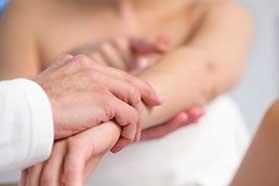Cellulitis Treatment in North Hampton, NH

Cellulitis is a common, potentially threatening bacterial skin infection, which occurs when bacteria infects subcutaneous tissue, the layer of tissue located just underneath your skin. The result is a red, swollen area of skin that feels hot and tender to the touch. Cellulitis in the legs is most common, though the condition may occur anywhere on the body or face. While not contagious, cellulitis is potentially threatening to your health when left untreated.
To schedule a consultation with a qualified healthcare provider in North Hampton that specializes in cellulitis treatment, call (207) 536-9661 or contact Dr. Johanna Mauss online.
Cellulitis Causes
Cellulitis is the result of bacteria, commonly streptococcus and staphylococcus, entering through a crack or break in your skin and infecting the subcutaneous tissue underneath your skin's surface. When these microorganisms—which usually reside harmlessly on the surface of the skin—penetrate the skin's protective barrier through abrasions, blisters, burns or insect bites, the subcutaneous tissue beneath your skin becomes inflamed, leading to the affected area of skin becoming swollen. This can occur due to:
- Injury that tears the skin
- Infection after injury
- Lon-term skin conditions such as dermatitis (eczema) and psoriasis
- Foreign objects in the skin
Though only affecting a small area initially, cellulitis will begin to slowly grow larger and spread. In addition to causing severe inflammation of the subcutaneous tissue, cellulitis causes inflammation of the dermis, the layer between your subcutaneous tissue and epidermis, and may lead to afflicted connective tissues, fever and swollen glands.
Cellulitis Symptoms
Symptoms of cellulitis commonly include:
- Red area of skin on one side of the body which may expand quickly
- A tight, glossy, swollen appearance of the skin
- Pain and tenderness in the affected area
- Skin dimpling
- Fever
More serious symptoms of cellulitis include:
- Shaking
- Chills
- Fatigue
- Dizziness and lightheadedness
- Muscle aches
- Warm skin
- Sweating
Cellulitis spreading to other parts of the body could be indicated by drowsiness, lethargy, blistering and red streaks. You should contact your healthcare provider if you experience any of the aforementioned symptoms.
Cellulitis Complications
Cellulitis can spread to your lymph nodes and through your bloodstream, which poses the greatest risk to your body. Cellulitis complications include damage to lymphatic drainage system and chronic swelling of the affected limb. In rare cases, when the infection spreads to the deep layer of tissue called the fascial lining, a condition called flesh-eating strep (necrotizing fasciitis) follows, an extreme emergency requiring immediate treatment.
Eye Cellulitis
Eye cellulitis can take two forms: periorbital and orbital. Periorbital cellulitis, also called preseptal cellulitis, is an infection of the eyelid and surrounding tissue outside a protective membrane called the orbital septum; orbital cellulitis is an infection of eye tissues inside the orbital septum. Periorbital cellulitis is most commonly caused by an infection like conjunctivitis or sinusitis, or an eyelid or facial injury. Orbital cellulitis is usually caused by an infection in adjacent tissues or elsewhere in the face, and tends to be more serious than periorbital cellulitis.
Cellulitis Treatment
Your healthcare provider can usually easily identify cellulitis by your skin's appearance, though blood tests or a wound culture may be recommended to help confirm a diagnosis and rule out other conditions like stasis dermatitis or contact dermatitis.
Cellulitis is typically treated with a prescription oral antibiotic (usually an antibiotic that is effective against both streptococci and staphylococci). Inform your healthcare provider three days into your antibiotic whether your cellulitis infection is responding to the antibiotic so adjustments to your prescription can be made. You should complete your course of antibiotics as directed by your healthcare provider, usually between 4 and 10 days but possibly up to 21 days, to ensure your cellulitis treatment is effective. Symptoms of cellulitis usually disappear after a few days. Hospitalized intravenous antibiotics may be necessary if your symptoms don't improve with your oral antibiotic, if your symptoms are extensive or if you have a high fever. For periorbital or orbital cellulitis, steroids may be prescribed to reduce eye swelling after the initial infection has been controlled by antibiotics.
Cellulitis poses a health threat; seek treatment with a qualified healthcare provider in North Hampton that specializes in cellulitis treatment. Call (207) 536-9661 or contact Dr. Johanna Mauss online.
Vibrant Health Natropathic Medical Center
Address
501 Islington StSuite 2B
Portsmouth, NH 03801
(207) 536-9661
vibranthealthnaturalmedicine.com/
Hours
Mon:
9:00 am - 5:00 pm
Tue:
9:00 am - 5:00 pm
Wed:
10:30 am - 5:00 pm
Thu:
9:00 am - 5:00 pm
Fri:
10:00 am - 4:00 pm
Sat:
Closed
Sun:
Closed


